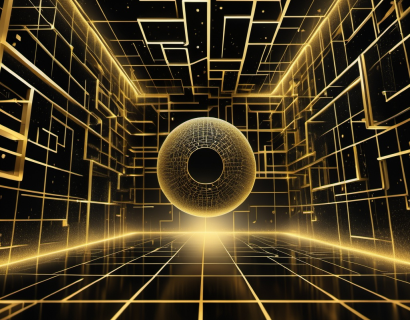Decentralized Innovation: Harnessing AI and Crypto for Next-Gen Digital Solutions
The digital landscape is undergoing a profound transformation, driven by the convergence of two revolutionary technologies: Artificial Intelligence (AI) and cryptocurrency. This intersection, often referred to as BlockchainAI, is giving rise to a new era of decentralized innovation. This comprehensive guide explores how the integration of blockchain and intelligent systems is redefining user experience and engagement, paving the way for next-generation digital solutions.
Understanding Decentralized Innovation
Decentralized innovation refers to the development and implementation of technologies and systems that operate without a central authority or intermediary. This approach leverages distributed networks, primarily blockchain, to ensure transparency, security, and decentralization. When combined with AI, the potential for innovation becomes immense, as these technologies can work synergistically to create more efficient, secure, and user-centric digital solutions.
The Role of Blockchain in Decentralized Systems
Blockchain technology, the backbone of cryptocurrencies, provides a decentralized ledger that records transactions across multiple computers. This ensures that no single entity has control over the data, making it highly resistant to tampering and fraud. In the context of decentralized innovation, blockchain serves as the foundation for building trust and ensuring the integrity of digital interactions. It enables peer-to-peer transactions, smart contracts, and decentralized applications (dApps) that operate independently of traditional centralized systems.
AI in Decentralized Ecosystems
Artificial Intelligence, with its ability to analyze vast amounts of data and learn from patterns, plays a crucial role in enhancing the capabilities of decentralized systems. AI can optimize blockchain networks by improving transaction processing speeds, reducing energy consumption, and enhancing security measures. Moreover, AI-driven analytics can provide insights into user behavior and preferences, enabling more personalized and engaging experiences on decentralized platforms.
Synergy Between AI and Blockchain
The combination of AI and blockchain creates a powerful synergy that drives decentralized innovation. Here are some key areas where this synergy is making a significant impact:
- Smart Contracts Enhanced by AI: Smart contracts, self-executing contracts with the terms directly written into code, can be augmented with AI to make decisions based on complex data inputs. This results in more intelligent and adaptive contract executions, reducing the need for manual intervention and increasing efficiency.
- Decentralized Data Markets: AI can help manage and optimize decentralized data markets, where data is bought and sold directly between users. AIalgorithms can match data suppliers with buyers based on relevance and quality, ensuring a fair and efficient market.
- Enhanced Security through AI: AI can enhance the security of blockchain networks by detecting and mitigating potential threats in real-time. Machine learning models can identify unusual patterns and anomalies, helping to prevent fraud and cyberattacks.
- Personalized User Experiences: By leveraging AI, decentralized platforms can offer highly personalized experiences to users. AI-driven recommendation systems can suggest content, services, and products based on individual preferences and behavior, enhancing user engagement and satisfaction.
Case Studies of Decentralized Innovation
Several projects and platforms are already demonstrating the potential of decentralized innovation through the integration of AI and blockchain:
1. Augur
Augur is a decentralized prediction market platform that uses AI to improve the accuracy of predictions. By leveraging AI algorithms, Augur can analyze vast amounts of data to provide more reliable and fair outcomes for bets placed on future events. This not only enhances user trust but also increases the overall utility of the platform.
2. Filecoin
Filecoin is a decentralized storage network that uses AI to optimize data storage and retrieval. AI algorithms help in managing the distributed storage nodes, ensuring data is stored efficiently and retrieved quickly. This makes Filecoin a robust alternative to centralized cloud storage services, offering higher security and lower costs.
3. Decentralized Finance (DeFi)
DeFi platforms are redefining the financial industry by providing decentralized banking services, lending, and trading. AI is used to enhance these services by offering risk assessment, fraud detection, and personalized financial advice. For instance, AI-driven bots can automate trading strategies on DeFi platforms, making them more accessible and efficient for users.
Challenges and Considerations
While the potential of decentralized innovation is vast, there are several challenges and considerations that need to be addressed:
1. Scalability:
One of the primary challenges is scalability. Blockchain networks, especially those using proof-of-work consensus mechanisms, can struggle with high transaction volumes. AI can help by optimizing network performance and developing more efficient consensus algorithms, but this remains an ongoing area of research and development.
2. Regulatory Uncertainty:
The regulatory landscape for blockchain and cryptocurrency is still evolving. Decentralized platforms must navigate varying legal frameworks and ensure compliance to operate effectively. AI can assist in monitoring regulatory changes and providing compliance recommendations, but human oversight remains crucial.
3. User Adoption:
Educating users about the benefits and functionalities of decentralized platforms is essential for widespread adoption. AI can play a role here by creating intuitive user interfaces and providing personalized onboarding experiences, making it easier for new users to engage with these technologies.
Future Prospects
The future of decentralized innovation is bright, with AI and blockchain continuing to evolve and integrate in new and exciting ways. Here are some potential developments to watch:
1. Interoperability:
Enhancing interoperability between different blockchain networks will be crucial for the growth of decentralized ecosystems. AI can help develop protocols and standards that enable seamless communication and data exchange between disparate systems.
2. Quantum Computing:
The advent of quantum computing poses both challenges and opportunities for blockchain and AI. While quantum computers could potentially break current cryptographic algorithms, they also offer the potential to solve complex problems that can further enhance the security and efficiency of decentralized systems.
3. AI-Powered Governance:
AI can play a significant role in the governance of decentralized platforms, enabling more democratic and data-driven decision-making processes. AI-driven tools can analyze community feedback and propose improvements, ensuring that platforms evolve in line with user needs and preferences.
In conclusion, the intersection o



